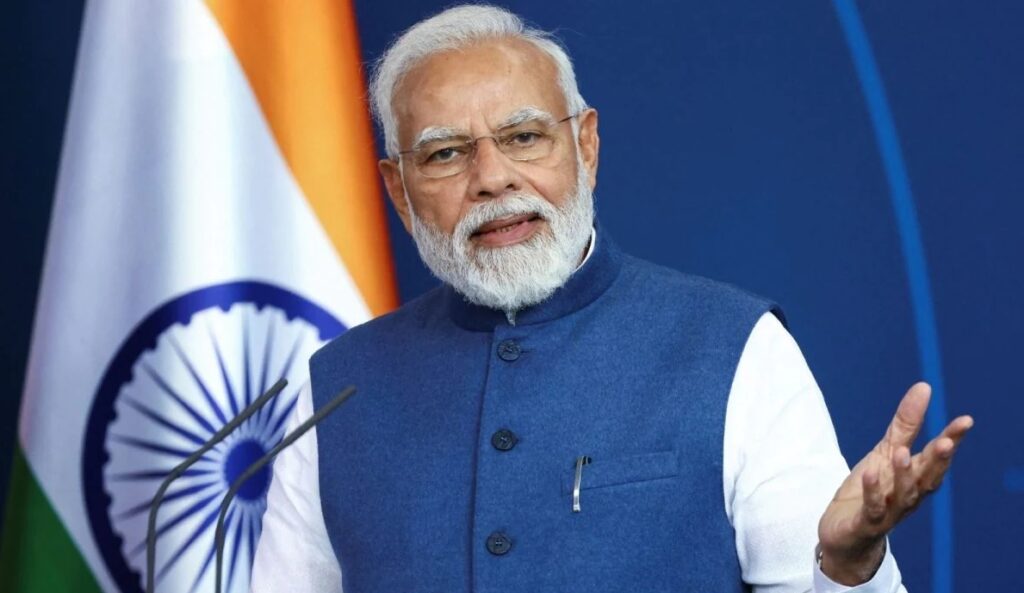“Narendra Modi” : A Leadership Journey of Dedication-Biography
Narendra Damodardas Modi was born on September 17, 1950, in Vadnagar, a tiny village in Gujarat, India. He would go on to become one of the most important and controversial personalities in Indian politics. His rise to the position of Prime Minister of India from a humble beginning is nothing short of incredible.
Narendra had a natural interest and hunger for information as a young child. He lost himself in books for hours in the local library, learning about a variety of topics. His early years were simple and basic, and despite his family’s poor means, he was able to overcome difficulties.
When Modi joined the Hindu nationalist Rashtriya Swayamsevak Sangh (RSS), he entered politics for the first time in the early 1970s. He was given a platform by the RSS to hone his organizational abilities and make connections with others who shared his desire for a powerful deeply rooted India.
Modi rose to prominence in the Bharatiya Janata Party (BJP), a right-wing national political party, in the late 1980s and early 1990s. He advanced quickly in the party ranks thanks to his attention to detail, smart thinking, and persuasive oratory abilities.
In October 2001, when Modi was chosen Gujarat’s Chief Minister, he had his first significant success. Both positive and negative reviews were made about his time as Chief Minister. While detractors expressed concerns about his government’s handling of certain occasions and regulations, supporters welcomed his focus on economic growth and his ability to draw investments to the state.
When Modi led the BJP to a stunning win in the 2014 Indian general elections, that was the turning point in his political career. In the Lok Sabha, the Indian Parliament’s lower chamber, the party won a resounding majority, and Narendra Modi was sworn in as the country’s fourteenth prime minister.
As Prime Minister (Narendra Modi), Modi led in an authoritative manner that placed a strong focus on governance and development. He introduced a number of ambitious programs including “Make in India,” “Swachh Bharat Abhiyan” (the Clean India Mission), and “Digital India.” Additionally, he concentrated on enhancing India’s healthcare, educational, and infrastructural sectors.
Also Read : Real Story of Oppenheimer in Hindi-ओपेनहाइमर की वास्तविक कहानी
Modi’s administration, nevertheless, has not been without controversy. Concerns concerning religious division, free expression, and human rights have been voiced by critics. Nevertheless, he continues to receive a lot of support from his party and supporters, and he is still quite popular with some segments of people.
Narendra Modi’s private life is cloaked in secrecy outside of politics. He is well-known for practicing yoga often writing, and loving technology. He frequently interacts with people on social media.
As a result, Narendra Modi’s rise from a young man from a tiny village to the position of Prime Minister of India is a monument to his tenacity, vision, and populist appeal. Although people’s views on him may differ greatly, there is no doubting that he has had a lasting effect on the political landscape of the country. Only time will be able to determine how history will evaluate his legacy as he keeps impacting India’s future.
Narendra Modi was born into a small household and had poor beginnings.
His schooling and family history are summarized below:
Background Information: Gujarat, India’s Mehsana district is home to the town of Vadnagar, where Narendra Modi was born on September 17, 1950. His mother, Heeraben Modi, was a housewife, while his father, Damodardas Mulchand Modi, had a tea shop. He was the third of the family’s six children.
schooling: Modi had his early schooling at Vadnagar. He finished his education in the neighborhood school in Vadnagar. He shown a strong interest in public speaking and debate during his school years, which hinted to his potential as a dynamic leader.
He attended the University of Delhi for his undergraduate studies, where he earned a political science bachelor’s degree. He then attended Gujarat University to obtain a postgraduate degree in political science.
Also Read : UPDATES: Chandrayaan-3 in Hindi-चंद्रयान-3 की पूरी जानकारी- Complete Information-Success
It is important to note that Modi did not continue his formal studies at esteemed schools and that his academic career was mostly centered on political science. Instead, he got involved in politics, notably as a supporter of the Hindu nationalist Rashtriya Swayamsevak Sangh (RSS).
Education was a key factor in forming Narendra Modi’s worldview and knowledge of administration during the course of his political career, ultimately catapulting him to the top of Indian politics. He continues to be a well-known and significant player on the international scene as the Prime Minister of India.

